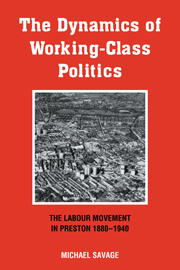Book contents
- Frontmatter
- Contents
- List of tables, maps and figures
- Preface
- Acknowledgements
- 1 Political practices and the social structure
- 2 The diversity of working-class politics
- 3 The local bases of practical politics
- 4 Labour market structure in Preston, 1880–1940
- 5 Urban structure and associational practices
- 6 The emergence of independent Labour politics, 1880–1914
- 7 The transformation of the Labour party, 1914–40
- 8 Conclusions
- Appendices
- Notes
- Bibliography
- Author index
- Subject index
- Frontmatter
- Contents
- List of tables, maps and figures
- Preface
- Acknowledgements
- 1 Political practices and the social structure
- 2 The diversity of working-class politics
- 3 The local bases of practical politics
- 4 Labour market structure in Preston, 1880–1940
- 5 Urban structure and associational practices
- 6 The emergence of independent Labour politics, 1880–1914
- 7 The transformation of the Labour party, 1914–40
- 8 Conclusions
- Appendices
- Notes
- Bibliography
- Author index
- Subject index
Summary
The Labour movement in Preston was strongly affected by its local environment. The capacities of various groups of workers to pursue different forms of practical politics had a major impact in forestalling certain forms of mobilisation and promoting others. Yet this process was always complex and mediated by the structures and activists of the political parties themselves, and since these parties were mainly concerned to secure electoral backing to gain strength in parliament, what happened at this national level was frequently of major importance in divorcing the parties from their local capacities. In Preston this process was observed on several occasions. The growing hostility of the state to trade unions at the turn of the century, allied to the Conservative party's adoption of tariff reform, undermined the local party's hegemony which had been based on its programme to advance working-class economistic interests in a stagnant local economy. Similarly the policies of the 1929 Labour government over women's issues and unemployment alienated these groups more generally from the Labour party.
National developments were therefore mainly of negative importance: they served to undermine existing forms of political mobilisation; but, so long as the party's national programme was compatible with local party efforts, the process of putting together a workable electoral bloc depended on local party action working within the capacities present in the area.
This point is demonstrated above all by the weakness of the Liberals in the late Victorian period.
- Type
- Chapter
- Information
- The Dynamics of Working-class PoliticsThe Labour Movement in Preston, 1880–1940, pp. 188 - 200Publisher: Cambridge University PressPrint publication year: 1988



